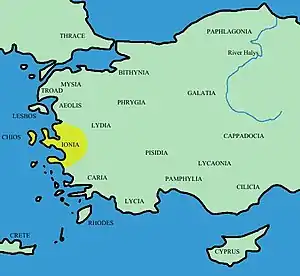Portal:Philosophy
The Philosophy Portal The Thinker, a statue by Auguste Rodin, is often used to represent philosophy. Philosophy (from Greek: φιλοσοφία, philosophia, 'love of wisdom') is the systematized study of general and fundamental questions, such as those concerning existence, reason, knowledge, values, mind, and language. Some sources claim the term was coined by Pythagoras (c. 570 – c. 495 BCE), although this theory is disputed by some. Philosophical methods include questioning, critical discussion, rational argument, and systematic presentation. Historically, philosophy encompassed all bodies of knowledge and a practitioner was known as a philosopher. "Natural philosophy", which began as a discipline in ancient India and Ancient Greece, encompasses astronomy, medicine, and physics. For example, Isaac Newton's 1687 Mathematical Principles of Natural Philosophy later became classified as a book of physics. In the 19th century, the growth of modern research universities led academic philosophy and other disciplines to professionalize and specialize. Since then, various areas of investigation that were traditionally part of philosophy have become separate academic disciplines, and namely the social sciences such as psychology, sociology, linguistics, and economics. Today, major subfields of academic philosophy include metaphysics, which is concerned with the fundamental nature of existence and reality; epistemology, which studies the nature of knowledge and belief; ethics, which is concerned with moral value; and logic, which studies the rules of inference that allow one to derive conclusions from true premises. Other notable subfields include philosophy of religion, philosophy of science, political philosophy, aesthetics, philosophy of language, and philosophy of mind. (Full article...)
|
Selected article of the week
Non-cognitivism is the meta-ethical view that moral statements lack truth-value and do not assert propositions. A noncognitivist denies the cognitivist claim that "moral judgments are capable of being objectively true, because they describe some feature of the world." If moral statements cannot be true, and if one cannot know something that is not true, noncognitivism implies that moral knowledge is impossible.
While the bare term non-cognitivism usually refers to ethics, it can also be applied in other branches of philosophy, as in theological noncognitivism.
 Good articles -
Good articles -
General images -
Selected pictures
Topics
Academic Branches of Philosophy
Philosophy ponders the most fundamental questions humankind has been able to ask. These are increasingly numerous and over time they have been arranged into the overlapping branches of the philosophy tree:
- Aesthetics: What is art? What is beauty? Is there a standard of taste? Is art meaningful? If so, what does it mean? What is good art? Is art for the purpose of an end, or is "art for art's sake?" What connects us to art? How does art affect us? Is some art unethical? Can art corrupt or elevate societies?
- Epistemology: What are the nature and limits of knowledge? What is more fundamental to human existence, knowing (epistemology) or being (ontology)? How do we come to know what we know? What are the limits and scope of knowledge? How can we know that there are other minds (if we can)? How can we know that there is an external world (if we can)? How can we prove our answers? What is a true statement?
- Ethics: Is there a difference between ethically right and wrong actions (or values, or institutions)? If so, what is that difference? Which actions are right, and which wrong? Do divine commands make right acts right, or is their rightness based on something else? Are there standards of rightness that are absolute, or are all such standards relative to particular cultures? How should I live? What is happiness?
- Logic: What makes a good argument? How can I think critically about complicated arguments? What makes for good thinking? When can I say that something just does not make sense? Where is the origin of logic?
- Metaphysics: What sorts of things exist? What is the nature of those things? Do some things exist independently of our perception? What is the nature of space and time? What is the relationship of the mind to the body? What is it to be a person? What is it to be conscious? Do gods exist?
- Political philosophy: Are political institutions and their exercise of power justified? What is justice? Is there a 'proper' role and scope of government? Is democracy the best form of governance? Is governance ethically justifiable? Should a state be allowed? Should a state be able to promote the norms and values of a certain moral or religious doctrine? Are states allowed to go to war? Do states have duties against inhabitants of other states?
Related Academic Fields
- Agricultural philosophy
- Axiology
- Ecosophy
- Environmental philosophy
- Hermeneutics
- History of philosophy
- Jurisprudence
- Meta-ethics
- Metalogic
- Metaphilosophy
- Neurophilosophy
- Phenomenology
- Philosophical anthropology
- Philosophy and literature
- Philosophy of artificial intelligence
- Philosophy of biology
- Philosophy of business
- Philosophy of chemistry
- Philosophy of copyright
- Philosophy of design
- Philosophy of economics
- Philosophy of education
- Philosophy of engineering
- Philosophy of film
- Philosophy of geography
- Philosophy of healthcare
- Philosophy of history
- Philosophy of information
- Philosophy of language
- Philosophy of life
- Philosophy of logic
- Philosophy of love
- Philosophy of mathematics
- Philosophy of mathematics education
- Philosophy of mind
- Philosophy of music
- Philosophy of perception
- Philosophy of physics
- Philosophy of probability
- Philosophy of psychology
- Philosophy of religion
- Philosophy of science
- Philosophy of sex
- Philosophy of social science
- Philosophy of space and time
- Philosophy of statistics
- Philosophy of technology
- Philosophy of thermal and statistical physics
- Philosophy of war
- Praxeology
List articles
- Index of philosophy
- List of philosophers
- List of philosophical concepts
- List of philosophical theories
- List of philosophy journals
- List of philosophy anniversaries
- Index of aesthetics articles
- Index of epistemology articles
- Index of ethics articles
- Index of logic articles
- Index of metaphysics articles
- Index of social and political philosophy articles
- Index of philosophy of law articles
- Index of philosophy of language articles
- Index of philosophy of mind articles
- Index of philosophy of religion articles
- Index of philosophy of science articles
- Index of ancient philosophy articles
- Index of medieval philosophy articles
- Index of modern philosophy articles
- Index of contemporary philosophy articles
- Lists of anarchism topics
- Index of analytic philosophy articles
- Index of continental philosophy articles
- Index of Eastern philosophy articles
Categories
Miscellaneous
Wikipedia Philosophy Resources

- Central Φ Discussion
- Recent Changes to Φ Articles
- Philosophy Categories
- Project_Structure
- Philosophy Style Guide
- New Φ Articles
- Most Popular Articles
- Philosophy Reference Resources
- Requested Φ Articles
- Requests For Comment
- Humanities Reference Desk
- Featured Φ Articles
- Φ Hall of Fame
- Φ Pages Needing Attention
- Φ Articles Proposed For Deletion
- Φ Cleanup Listing
- Article Assessment
- Log of Assessment Changes
- Assessment Statistics
- Wikiversity School of Philosophy
Task forces
WikiProject Philosophy
- Philosophers
- Φ Literature
- Aesthetics
- Epistemology
- Ethics
- Logic
- Metaphysics
- Social Φ
- Ancient Φ
- Medieval Φ
- Modern Φ
- Contemporary Φ
- Analytic Φ
- Continental Φ
- Anarchism
- Marxism
- Eastern Φ
- Φ of Language
- Φ of Mind
- Φ of Religion
- Φ of Science
Related WikiProjects
- Alternative views
- Arts
- Atheism
- Biblical criticism
- Biography
- Christianity theology
- Hindu Philosophy
- History of Science
- History
- Islam
- Judaism
- Linguistics
- Literature
- Mathematics
- Middle ages
- Mythology
- Physics
- Rational skepticism
- Religion
- Science
- Spirituality
Associated Wikimedia
The following Wikimedia Foundation sister projects provide more on this subject:
-
 Commons
Commons
Free media repository -
 Wikibooks
Wikibooks
Free textbooks and manuals -
 Wikidata
Wikidata
Free knowledge base -
 Wikinews
Wikinews
Free-content news -
 Wikiquote
Wikiquote
Collection of quotations -
 Wikisource
Wikisource
Free-content library -
 Wikispecies
Wikispecies
Directory of species -
 Wikiversity
Wikiversity
Free learning tools -
 Wikivoyage
Wikivoyage
Free travel guide -
 Wiktionary
Wiktionary
Dictionary and thesaurus
Web resources
- PhilPapers: Online Research in Philosophy
- Introducing Philosophy Series
- Dictionary of Philosophical Terms and Names
- Stanford Encyclopedia of Philosophy
- Collection of debate guides
- The Internet Encyclopedia of Philosophy
- The reference library for Jain Philosophy
- Cosmos and History: The Journal of Natural and Social Philosophy
- Early Modern Texts
- Philosophy Now
- The Philosophers' Magazine Online
- Indiana Philosophy Ontology Project Taxonomy search tool
- Noesis - Philosophical research online
- Notre Dame Philosophical Reviews
Sources
More portals
-
 List of all portalsList of all portals
List of all portalsList of all portals -
 The arts portal
The arts portal -
 Biography portal
Biography portal -
 Current events portal
Current events portal -
 Geography portal
Geography portal -
 History portal
History portal -
 Mathematics portal
Mathematics portal -
 Science portal
Science portal -
 Society portal
Society portal -
 Technology portal
Technology portal -
 Random portalRandom portal
Random portalRandom portal -
 WikiProject PortalsWikiProject Portals
WikiProject PortalsWikiProject Portals





.jpg.webp)


.jpg.webp)
.jpg.webp)















_Mausoleum_-_Hamadan_-_Western_Iran_(7423560860).jpg.webp)











.jpg.webp)


.jpg.webp)

.jpg.webp)








.png.webp)


.jpg.webp)








.jpg.webp)

%253B_Sir_Thomas_Browne_by_Joan_Carlile.jpg.webp)
.JPG.webp)




_-_Nationalmuseum_-_15723.tif.jpg.webp)
![Image 15Adam Smith (baptised 16 June 1723 – died 17 July 1790 [OS: 5 June 1723 – 17 July 1790]) was a Scottish moral philosopher and a pioneer of political economics. One of the key figures of the Scottish Enlightenment, Smith is the author of The Theory of Moral Sentiments and An Inquiry into the Nature and Causes of the Wealth of Nations. The latter, usually abbreviated as The Wealth of Nations, is considered his magnum opus and the first modern work of economics. Smith is widely cited as the father of modern economics.](../I/Kirkcaldy_High_Street_Adam_Smith_Plaque.png.webp)

